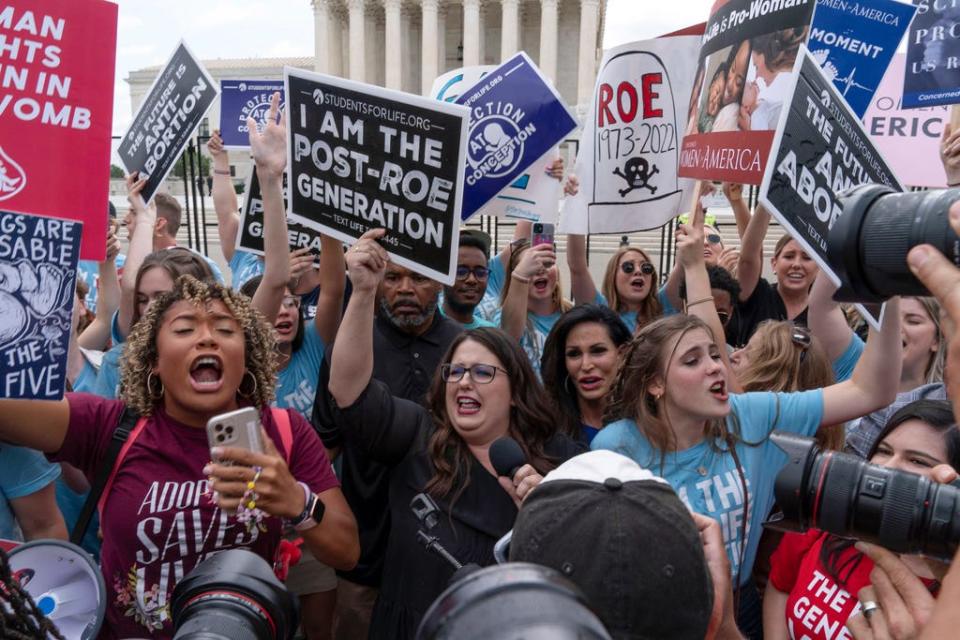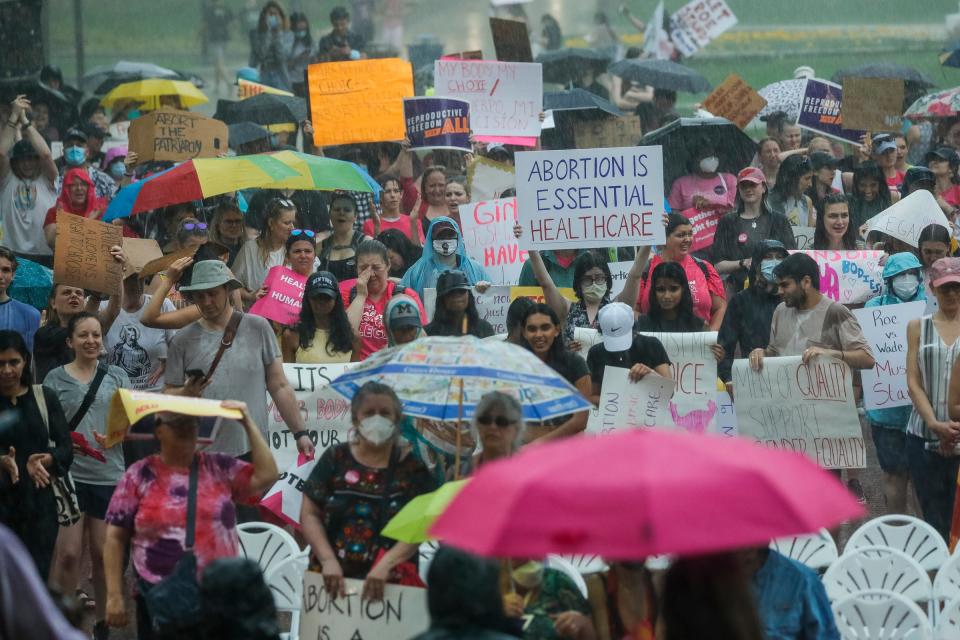Supreme Court overturns Roe v. Wade, leaving abortion questions for millions in Michigan
Millions of Michiganders lost the national right to legal abortions Friday after the U.S. Supreme Court overruled Roe v. Wade, upending nearly 50 years of judicial precedent and changing the dynamics of reproductive health in the country for years to come.
While abortions are still legal in Michigan, that could change at any moment if a temporary injunction blocking the enforcement of a state ban is lifted or otherwise removed.
[ Want more updates on this developing story? Download our app for the latest ]
The 6-3 decision in Dobbs v. Jackson Women’s Health obliterates the seminal case that legalized a constitutional right to an abortion nationally in 1973, Roe v. Wade. Chief Justice John Roberts agreed to uphold the Mississippi law at the heart of the Dobbs case but would not have ruled to overturn Roe, meaning the ultimate decision to nix national abortion rights was 5-4.
In theory, that would mean Michigan’s law criminalizing most abortions is again enforceable: A 1931 statute only allows abortions "necessary to preserve the life of such woman,” a vague standard left untested by doctors and the courts for decades. The law on Michigan’s books does not allow exceptions for cases of rape or incest.

However, a May ruling by a Michigan Court of Claims judge aims to temporarily block enforcement of that law. Although Michigan Attorney General Dana Nessel already said she doesn’t plan to charge anyone under the law, it’s unclear whether law enforcement at the local level will test the court of claims’ injunction.
More: Michigan court ruling not the final say on abortion constitutionality in state
More: FAQ: In wake of Texas abortion law controversy, here's a look at abortion law in Michigan

The sweeping U.S. Supreme Court ruling was not unexpected — its language mirrors the text of a draft opinion published by Politico in early May. It is celebrated as a win by critics of abortion rights, who have campaigned for years against Roe and in favor of justices who may overturn the decision.
But the impact of the court’s decision creates far-reaching questions, from the future of privacy rights and constitutional due process to the parameters of what constitutes a lifesaving procedure and the implications of criminalizing a process conducted more than 1.2 million times in Michigan in the last 40 years.
"The Constitution does not confer a right to abortion; Roe and Casey are overruled; and the authority to regulate abortion is returned to the people and their elected representatives," reads one brief portion of the decision, authored by Justice Samuel Alito.
Anyone who violates the state law is guilty of a felony and may be imprisoned for up to four years. The law clearly applies to doctors, but abortion rights advocates fear zealous law enforcement may go after the people seeking abortions as well. In theory, someone could be prosecuted for taking medication to induce an abortion — such abortions accounted for more than 51% of all procedures conducted in Michigan in 2021.
Nessel and seven local prosecutors vowed not to charge anyone under the law, but other local prosecutors haven’t made the same promise. And even if all vowed to ignore the law, that doesn’t mean abortion providers would continue to operate.
But Dr. Sarah Wallett, chief medical officer for Planned Parenthood of Michigan, fought back tears Friday as she vowed to still serve anyone who comes to a clinic seeking an abortion.
"To be clear, abortion is still legal in Michigan and our doors are still open. But my heart is breaking for the millions of patients living in states that will cut off abortion access today in the days to come," Wallett said during a virtual news conference.
"We are not going anywhere. I am going to leave this press conference and go continue to provide abortions to patients who need them here in Michigan. We will never stop fighting to protect abortion access."
Paula Thornton Greear, the new president and CEO of Planned Parenthood of Michigan, says the court's ruling blocking enforcement of the abortion ban gave her providers new hope and optimism. She also vowed to do everything in her power to ensure patients and providers are safe in the days to come.
"We are here for you. Our doors are open, and we're going to damn well make sure that they stay open," she said.
A spokeswoman for Nessel previously did not say whether the state law immediately takes effect. But lawsuits filed in April by Gov. Gretchen Whitmer and Planned Parenthood asked several different Michigan courts to temporarily bar enforcement of the law until justices can determine whether the law is constitutional and whether the Michigan Constitution includes the right to an abortion.
More: Michigan conservative activists want Court of Appeals to overturn abortion law injunction
More: Planned Parenthood injunction now central in Whitmer's abortion lawsuit
Court of Claims Judge Elizabeth Gleicher recently determined Planned Parenthood had a high likelihood of winning its legal case, issuing the preliminary injunction while she’s pondering a final decision in that case. Because Nessel is not challenging Gleicher’s decision, the GOP-led Legislature and a conservative legal organization have intervened in the case to fight Planned Parenthood’s arguments.
A decision from the Michigan Court of Appeals on the requests to overturn Gleicher's injunction could come at any moment.
There are 27 free-standing abortion clinics in 13 Michigan counties. Local prosecutors representing millions of Michiganders in seven counties, including Wayne, Oakland and Washtenaw counties, vowed weeks ago to ignore the 1931 law and not use it to prosecute pregnant people or doctors.
That does not mean law enforcement won’t arrest people providing or seeking abortions in those counties. But all seven prosecutors confirmed to the Free Press even if law enforcement brought their office a case under the 1931 law, they would not prosecute.
“To put it mildly, there is a tremendous amount of uncertainty here. That’s because we have an archaic law that is nearly 100 years old, and that has not been enforced for the past half-century because of Roe,” said Washtenaw County Prosecutor Eli Savitt before the high court's decision.
“That’s part of the reason why — beyond my pledge not to prosecute — I’m strongly supportive of any and all efforts to get that 1931 law off the books. I can and will exercise my discretion not to charge abortion if the law remains. But the existence of the law means that the threat of unjust, harmful, and arbitrary results will endure.”
But prosecutors in other counties promised to follow the law.
Jerry Jarzynka, the prosecutor in Jackson County, didn’t join with the seven other prosecutors who expressed support for Whitmer’s lawsuit. He told the Free Press his office would examine abortions individually before deciding to bring charges.
“We would handle it like any type of case, it would come out for review,” Jarzynka said. “Whether you charge a case or not can be based on a case review by police, what evidence they find. That's what we normally do for any type of case we’re looking to charge. You've got to go through that process, and it's a case by case review.”
Jarzynka, along with Kent County Prosecutor Chris Becker, have filed motions to intervene in Planned Parenthood's lawsuit. Becker's office declined a request for comment from the Free Press.
Macomb County Prosecutor Pete Lucido agreed, saying he would follow the law and pursue prosecutions if police presented evidence someone broke the law.
"Either we have laws that we're going to enforce or we don't need lawmakers," Lucido told the Free Press ahead of the Dobbs ruling.
"We are ministers of justice. We don't look at cases wholesale, we individualize them. Each judge, when they look at a case, is not supposed to say, 'this is morally improper.' It's about, did the person commit the crime? Was the law broken, as it is written? They are supposed to enforce the law."
More: Whitmer to Michigan Supreme Court: 'Time is of the essence' on abortion lawsuit
More: Michigan Court of Claims judge grants injunction against 1931 abortion law
Almost nine out of 10 of the nearly 30,000 abortions performed in 2020 in Michigan were done at a free-standing outpatient surgical facility, according to the state health department. The state does not track how many abortions were performed to save the life of a pregnant person, but under the framework of what is allowed under the 1931 law, many more abortions moving forward would likely be performed at a hospital.
However, the subjective nature of what constitutes a procedure done to save a life leaves many medical professionals nervous and scared.
“What does the risk of death have to be, and how imminent must it be? Might abortion be permissible in a patient with pulmonary hypertension, for whom we cite a 30 to 50% chance of dying with ongoing pregnancy? Or must it be 100%?” wrote Dr. Lisa Harris, a gynecologist and abortion provider who works at the University of Michigan, in a recent article published by the New England Journal of Medicine.
“When we diagnose a new cancer during pregnancy, some patients decide to end their pregnancy to permit immediate surgery, radiation, or chemotherapy, treatments that can cause significant fetal injury. Will abortion be permissible in these cases, or will patients have to delay treatment until after delivery? These patients’ increased risk of death may not manifest for years, when they have a recurrence that would have been averted by immediate cancer treatment.”
Doctors working at Planned Parenthood are asking the same questions. But, emboldened by the injunction, Thornton Greear said before the ruling the state already saw an influx of abortion patients from as far away as Texas.
She hopes an ongoing effort to change the state constitution so that it expressly protects abortion through a ballot initiative will be successful later this year. But for now, she believes the protections offered by Gleicher's ruling, even if they are temporary, should ease concerns of people who need an abortion.
"I know that this can be a confusing time, a perhaps scary time for people who need care. And I want them to know that as I step into this role, Planned Parenthood of Michigan is not going away," Thornton Greear said.
"We're going to continue to do everything that we can to protect and expand that access ... everybody deserves access to health care. And let me be clear once again, abortion care is health care."
Contact Dave Boucher: [email protected] or 313-938-4591. Follow him on Twitter @Dave_Boucher1.
This article originally appeared on Detroit Free Press: Roe v. Wade overturned: How it impacts Michigan abortion law
Solve the daily Crossword

